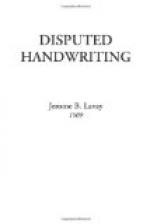There is no rule of law fixing the precise amount of experience or degree of skill necessary to constitute a handwriting expert. The witness need not be engaged in any particular business or claim to be a professional expert. He must, however, claim to have experience. With that limitation, cashiers, paying tellers, other bank officers, attorneys, bookkeepers, business men, conveyancers, county officials, photographers, treasurers and clerks of railroads, etc., and writing teachers have in various cases been held competent to testify as an expert. And it has been held that experience with handwriting generally or specially will enable the witness to testify specially or generally thereto. Bank officials, and especially cashiers, tellers, and book-keepers, are usually regarded as competent by most courts to pass authoritatively upon handwriting.
Generally speaking, the witness must claim to be an expert, or at least show that he had the means of gaining experience. He need not claim to be an expert, but he must claim to have had such experience as will make him feel competent to express an opinion.
He may always give the reasons for his opinion, but he must confine his testimony to his opinion based on the handwriting itself, and not as affected by the facts of the case. He cannot state any inferences deduced from the facts. He must also testify himself. Evidence of what an expert has said with reference to a writing is inadmissible for the purpose of bringing that opinion before the court.
An expert may be tested with other papers in the case, but not with irrelevant papers, and the whole of the test paper must be shown him. He is entitled to see it all.
Letter-press copies and duplicates made by writing machines are not originals and therefore cannot be used as a standard of comparison.
An expert cannot give an opinion as to the genuineness of a signature based upon a comparison thereof with signatures not before the court.
The standard of comparison used by the expert must be produced in court. Photographic copies are admissible when accompanied by the originals. When original writings are in evidence and the genuineness thereof disputed, magnified photographic copies of the writing and of admitted genuine writings are admissible in evidence, for comparison by jury or expert when accompanied by competent preliminary proof that the copies are accurate in all respects except as to size and color.
The services of the expert are required in a wide range of civil and criminal cases. Where handwriting is questioned on notes, checks, drafts, receipts, wills, deeds, mortgages, bonds, anonymous letters, money orders, registered letter receipts, letters, pension papers, and in smuggling, and in short, on any kind of document where it becomes necessary to establish the identity of the writer, the expert is called in. Life, liberty, honor, and property are frequently balanced on a pen point—a few marks of the pen being the determining feature of many a case.




